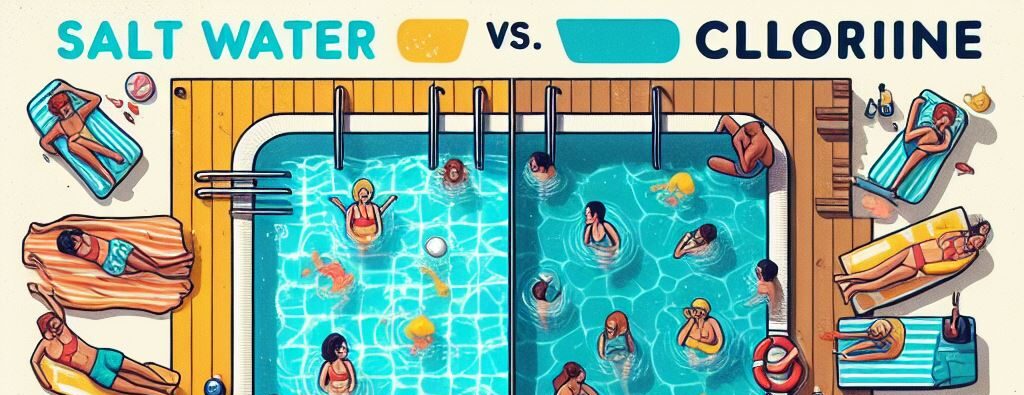
Dipping into the cool, clear waters of a swimming pool is a respite we all crave during hotter days or after a tiring stretch of work. But before you can paddle in your private oasis, there’s a critical decision to be made—one that not only affects your comfort and health but also the environment and your wallet. The question arises: should you invest in a saltwater pool or opt for the traditional chlorine pool?
In this comprehensive guide, we’ll dive deep into the world of saltwater and chlorine pools, grinding down the pros and cons, maintenance and cost, evaluating health and environmental impacts, and providing insights to help you choose the perfect pool for your backyard sanctuary.
Introduction
Swimming pools have long been a haven for leisure, exercise, and entertainment. And while they all serve the same purpose, the way they are sanitized can differ significantly.
Saltwater pools utilize a salt chlorinator system to convert salt into chlorine, gently releasing it into the water for purification. On the other hand, chlorine pools rely on the direct addition of chlorine chemicals to prevent bacterial growth and keep the pool clean.
Both systems have their advocates and critics, with various myths circulating about each. Let’s break down what you need to know about these sanitization methods, so you can make a splash in making the right choice!
Pros and Cons of Salt Water Pools
Saltwater pools have surged in popularity due to their perceived ease of use and health benefits. But like anything, they come with their own set of considerations.
Benefits of Salt Water Pools
- Softer Water: Saltwater pools are often lauded for their “softer” water, which translates to a silky, more pleasant swimming experience. This softness is gentler on your skin and hair, reducing the need for post-swim showers and heavy use of hair conditioners.
- Fewer Chemicals: Since saltwater pools generate chlorine as needed through electrolysis, you won’t have to handle or store harsh chlorine products as often.
- Consistent Chlorine Levels: The continuous process of chlorine generation can help maintain more consistent chlorine levels, reducing the chances of algae and bacterial growth.
Challenges of Salt Water Pools
- Initial Cost: The setup for a saltwater system can be more expensive than a traditional chlorine system. This is due to the initial investment in a salt chlorine generator. The cost to convert your existing chlorine-based pool to a salt one can be between $500 and $3,000.
- Maintenance: While daily maintenance may be lighter, saltwater systems still require careful monitoring of salt levels and pH. They also need periodic cleaning and eventual replacement of the cell, which can be costly. Expect monthly maintenance costs between $70-$90/year.
Check Out Our More Salt Chlorine Generators on Our Amazon Storefront!
Pros and Cons of Chlorine Pools
Chlorine pools have been the standard for many years, and there are plenty of good reasons why they are still widely used.
Benefits of Chlorine Pools
- Effective Sanitization: Chlorine is a time-tested sanitizer that effectively keeps pools free of harmful organisms.
- Lower Upfront Cost: Starting a chlorine pool generally involves less initial investment compared to salt water systems.
Drawbacks of Chlorine Pools
- Harsh Chemicals: The chemicals used in chlorine pools can be harsh on the skin, eyes, and even clothing, causing irritation and fading.
- Maintenance: Chlorine levels in these pools can fluctuate, requiring regular testing and adjustment to ensure sanitary conditions. The yearly maintenance cost can be up to $800.
Comparing Maintenance and Cost
Maintaining a pristine pool is essential regardless of the sanitization method chosen.

Maintenance Requirements of Salt Water Pools
Saltwater pools require regular checks on the chlorine generator to make sure it’s producing the correct amount of chlorine. The cell plates within the generator also need to be cleaned of calcium buildup, and while salt cells last longer, they are a significant expense when replacement is necessary.
Maintenance Requirements of Chlorine Pools
Chlorine pools need consistent monitoring and adjustments. This can mean adding chlorine manually or using an automatic dispenser, and regular shock treatments may be necessary to keep the water clean.
Cost Comparison of Salt Water and Chlorine Pools
When it comes to cost, both systems require investments in different areas. Saltwater pools have higher initial costs but potentially lower ongoing chemical costs. Chlorine pools are less expensive to start but can be costlier over time due to the chemicals required.
Impact on Health and the Environment
The implications of your pool choice extend beyond financial concerns, touching upon health and environmental welfare as well.
Total Pool Care Course Bundle
Get all three popular pool courses including the flagship pool care video course, the money-saving guide for pool owners, and the pool winterization course all for one low price!
Effects of Salt Water on Skin and Hair
Saltwater pools tend to be more agreeable with swimmers’ bodies. The lower concentration of chlorine results in fewer instances of dry skin and hair, making for a more comfortable post-swim experience.
Impact of Chlorine on Skin and Respiratory System
The more intense disinfection process of chlorine pools can cause red eyes, itchy skin, and for those with sensitivities, respiratory issues. Properly maintained pools can minimize these effects, but they remain a common complaint among swimmers, especially ones with sensitive skin.
Environmental Considerations of Both Options
Saltwater pools have a slight edge when it comes to environmental impact, largely due to lower chemical usage. However, they are not without their faults, as high salt concentration backwash from the pool can be detrimental to the soil and plants nearby. In contrast, chlorine pools carry concerns regarding chemical runoff and water quality.
Choosing the Right Pool for You
Making the right pool choice depends on a medley of factors including budget, personal preferences, and your location’s climate and regulations.
Consider how sensitive you and your family members are to chlorine, how comfortable you are with handling chemical-based pool treatments, and what your long-term budget is for pool maintenance.
Seeking professional advice from local pool experts can provide tailored recommendations and insight into what might best suit your lifestyle and region’s conditions.
Conclusion
Whether you gravitate towards the gentle embrace of salt water or the familiar touch of chlorine, your choice will define your swimming experience for years to come. Both saltwater pools and chlorine pools offer distinct advantages and pose unique challenges, and understanding these can lead to informed, satisfying decisions.
We encourage you to weigh the pros and cons based on your individual needs, consult with pool professionals to gain an understanding of which system works best for you and explore our resources for comprehensive information on pool maintenance and care.
Perhaps the most important takeaway is to never put the decision on the back burner. Both systems require a dedicated owner who will maintain the pool’s balance and health. Happy swimming!
And if this guide has helped settle the saltwater vs chlorine pool debate for you, feel free to share your newfound clarity with others who may be wading through the same decision. Share this post and spread the knowledge!
I would like to take a moment to express my deepest gratitude to all my readers. Your continued support and engagement have been the backbone of this blog.
Thank you for being a part of this journey, for your insightful comments, and for sharing these posts within your networks.
You are truly the heart and soul of this blog, and I look forward to sharing more exciting content with you in the future.
Cheers!



